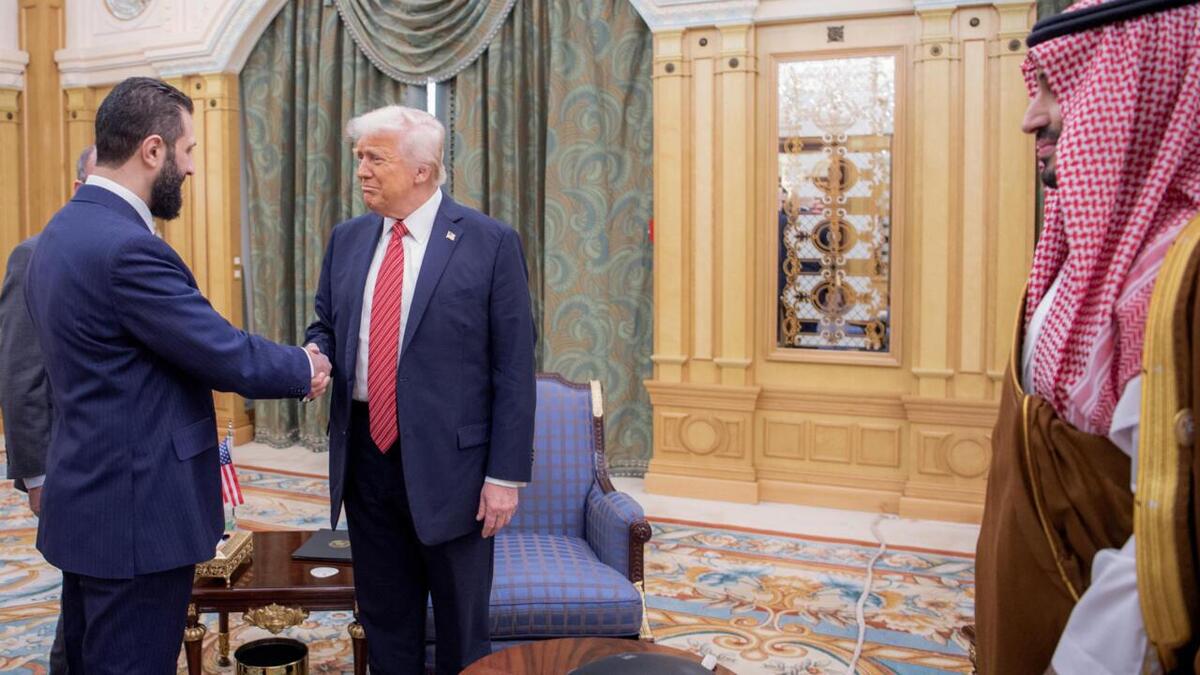Julani's Three Strategic Goals for Meeting Trump in Riyadh

On Wednesday, Abu Muhammad al-Julani (Ahmed al-Shara), head of the Syrian interim government, met with Donald Trump through the mediation of Saudi Crown Prince Mohammed bin Salman in Riyadh.
The last time Hafez al-Assad and Bill Clinton, then presidents of Syria and the United States, met was 29 years ago in 1996, which adds to the importance of al-Shara's meeting with Trump after decades of cold relations between Damascus and Washington.
Since coming to power, Ahmed al-Sharaa has tried to advance the process of internal developments in Syria without granting any concessions to other Syrian actors, to ensure his monopoly of power and complete control over Damascus and to remove other actors from the power equations in the country.
In practice, this issue has caused dissatisfaction in many European countries, Russia, and even the Biden administration in the United States. However, it seems that with Trump's entry into the White House, attention to the role of other parties in the political developments in Syria has become less important than before. Trump's lack of special attention and concern for internal developments in Syria has facilitated the establishment of relations between Damascus and Washington.
In the meantime, it should be added that this important meeting is of strategic importance for the head of the Syrian transitional government in three ways:
1. Efforts to lift economic sanctions on Syria
Few observers would doubt that the heavy sanctions imposed by the US government against the Bashar al-Assad regime, also known as the Caesar sanctions, were one of the most important factors in weakening the country's economic foundations and ultimately the collapse of the Assad regime.
After the overthrow of the Bashar al-Assad regime, many countries in the region were particularly ready to invest and enter the Syrian economic market, but they faced a major obstacle in this path called the Syrian economic sanctions. Now, it seems that the official announcement by the US President of the lifting or even granting exemptions from sanctions to the new Syrian political system will facilitate the entry of foreign capital into the Syrian market and economy, which will increase the popularity and acceptance of the Ahmed al-Sharaa regime among Syrian citizens.
On the other hand, this will significantly strengthen the circle of power of Al-Jolani among other rival groups and currents.
2. Attempting to gain international legitimacy
The status of Al-Julani's self-proclaimed government in the international environment was extremely shaky before he met with Trump on Wednesday. For example, the trips of many senior officials of European countries such as France and Germany to Damascus in previous months and the meeting with Al-Julani were, above all, within the framework of advancing the process of implementing UN Resolution 2254, which emphasized the need to form a transitional government for political transition in the country and holding elections.
Many countries in the world considered the Golani government as a transitional and temporary government that is responsible for completing the political transition process by drafting a new constitution and holding general elections, and handing over power to the elected government and regime.
This is in a situation where advancing the resolution 2254 process is considered a threat to his political future at the top of the ruling regime in Damascus, from Golani's perspective, and for this reason, he refuses to implement it.
Julani believes that if he and the government based in Damascus are recognized by Trump's America, the way will be opened for his recognition by other countries in the region and the world, so that he will be recognized regionally and internationally as the undisputed and undeniable ruler in Damascus and impose himself as the final and unrivaled option.
In addition, his meeting with Trump can reduce the international pressure on his interim government to implement UN resolution 2254.
3. The competition between Al-Julani and Mazloum Abdi for Washington’s support
Another strategic goal of Abu Muhammad Al-Julani’s trip to Riyadh and meeting with the US President was that over the past decade, this country was considered one of the main supporters of the Syrian Democratic Forces (SDF) led by Mazloum Abdi, who enjoyed close relations with Washington throughout the years of the Syrian crisis.
Since the establishment of the SDF in October 2015, the relationship between the US government and the ruling regime in Damascus has been completely severed, and this group has become an actor supported by the US in the internal developments in Syria.
Through this path, the SDF has succeeded in obtaining significant military and economic capital, thanks to its special relations with the White House, which were effective in strengthening the position of this group, especially in the geography of northeastern Syria.
The restoration of direct relations between Damascus and Washington could undoubtedly seriously damage the special relations between the SDF and the United States, so that Mazloum Abdi and the forces under his command will no longer be able to use the card of their strategic relations with the United States in their possible future negotiations with Damascus.
Trump's visit, along with the release of news that the US President has ordered the withdrawal of American troops from eastern Syria and their transfer to Iraq, probably indicates the strengthening of the position of the government based in Damascus against the SDF in Washington.